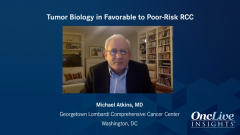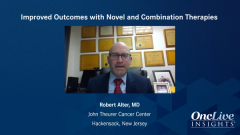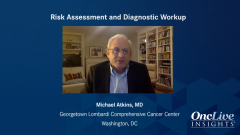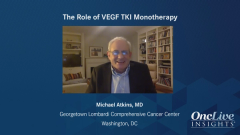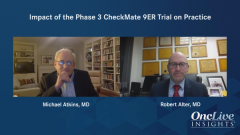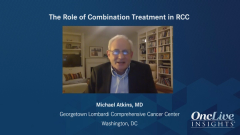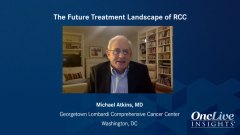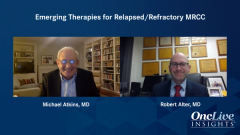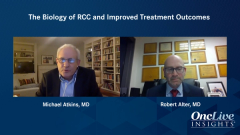
Tumor Biology in Favorable to Poor-Risk RCC
Episodes in this series

Michael Atkins, MD: With regard to how we use those therapies, we’re at a crossroads. We initially had some prognostic variables that came out of Memorial Sloan Kettering Cancer Center that were focused on how patients did in terms of overall survival when they were receiving interferon, which didn’t work well. It was the really the natural biology of the disease.
Through the early part of the 2000s when the VEGF receptor TKIs [tyrosine kinase inhibitors] were being used, the IMDC [International Metastatic Renal Cell Carcinoma Database Consortium] group developed new prognostic variables that predicted outcome for patients receiving VEGF receptor TKIs. It divided patients into favorable, intermediate, and poor-risk categories based on the number of poor prognostic factors that the patients had. Those factors were used as stratification factors in the phase 3 trials for checkpoint inhibitors. Those have led to results in different prognostic groups, and that has led to different approvals, but it’s unclear to what extent those clinical prognostic factors represent the true biology of the tumor.
For example, data seem to suggest that favorable-risk patients, as defined by the IMDC classification, are more likely to have tumors that have VHL loss. They are more likely to be VEGF-driven with less of an inflammatory or immunologic signature than the intermediate and poor-risk tumors. Tumors that are favorable risk are also more likely to be firm and nuclear grade 2 or 3 and lack sarcomatoid features. They more frequently have metastases to the pancreas and the thyroid gland, and on a genomic level, they are more likely to have comutations in PBRM1, which is another gene that’s on chromosome 3 right next to VHL, than they are to have mutations in BAP1. Those are 2 sets of mutations in chromosome 3, near VHL, that are mutually exclusive. Patients with favorable risk are also less likely to have PD-L1 expression and less likely to have T cells in their tumor microenvironment. These are the patients who are rich in tumors that are likely to respond to VEGF receptor TKIs or those who could be managed by close surveillance.
However, it’s important to point out that those clinical characteristics do not always correlate directly with these biologic characteristics, meaning that you could have a patient with favorable risk based on clinical characteristics who has a tumor biology that is more likely to be responsive to immunotherapy. Therefore, I’m getting away from using those IMDC prognostic characteristics more and more in my decision-making for what therapies I should give to patients.
Transcript Edited for Clarity


